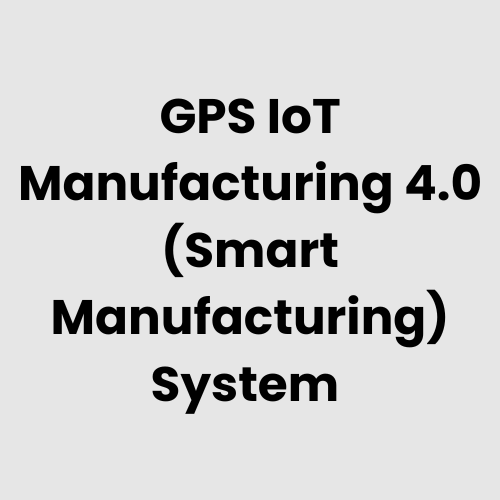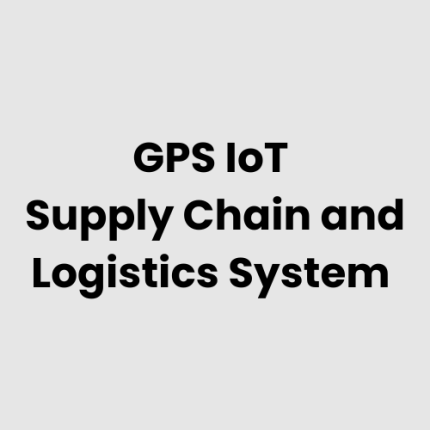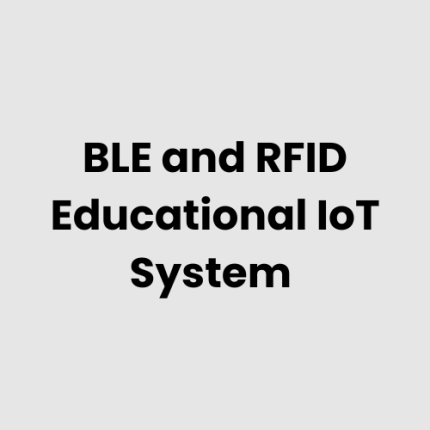GPS IoT Manufacturing 4.0 (Smart Manufacturing) System
Discover the technical architecture and deployment considerations for GPS IoT Enabled Manufacturing 4.0 (Smart Manufacturing) with GAOTek Inc. solutions.
Description
GPS IoT Enabled Manufacturing 4.0 (Smart Manufacturing) Technical Architecture
The technical architecture of GPS IoT Enabled Manufacturing 4.0 integrates real-time data collection from industrial machines, assets, and environmental factors into a central platform for analysis and decision-making. The system involves a mix of IoT sensors, data gateways, and cloud infrastructure, designed to support predictive maintenance, automation, and workflow optimization across manufacturing facilities.
The architecture typically includes:
- IoT Sensors: Devices to monitor machine performance, equipment health, and environmental factors.
- Gateways: For secure transmission of sensor data to a central server or cloud system.
- Edge Computing: To process data locally for low-latency applications.
- Cloud Platform: For data aggregation, machine learning models, and analytics.
- Enterprise Integration: To connect with ERP, SCM, and other enterprise systems for end-to-end automation.
- User Interfaces: Dashboards and mobile apps for real-time monitoring, control, and alerts.
Hardware of GPS IoT Enabled Manufacturing 4.0 (Smart Manufacturing)
- IoT Sensors: Temperature, vibration, humidity, pressure, and motion sensors.
- Gateways: Devices that facilitate the secure transmission of data from sensors to cloud or local servers.
- Edge Devices: For local data processing and reducing dependency on cloud resources for real-time decisions.
- Smart Machines: Machines equipped with sensors and actuators that communicate directly with the central system.
- Servers/Computing Units: Physical servers to process and store data locally in edge computing scenarios.
- Mobile Devices/Tablets: For real-time monitoring and control by plant managers and operators.
Physical Placement Considerations of the Hardware of GPS IoT Enabled Manufacturing 4.0 (Smart Manufacturing)
When placing hardware, it is important to ensure sensors are mounted close to the equipment they monitor, with accessibility for maintenance. Gateways should be placed in centralized locations within the manufacturing plant to optimize connectivity. Edge computing devices should be deployed at key points of the plant floor to minimize latency for real-time processing. Mobile devices for plant personnel should be distributed based on usage needs, ensuring operators have easy access to them at critical workstations.
Hardware Architecture of GPS IoT Enabled Manufacturing 4.0 (Smart Manufacturing)
- Sensor Network: Distributed across equipment and machines to capture key operational metrics (e.g., vibration, temperature, and humidity).
- Gateways: Act as the link between the local IoT devices and the cloud/server, ensuring secure data transmission.
- Edge Computing: Devices placed at specific network nodes for real-time decision-making and reducing cloud dependency.
- Centralized Servers: Host data storage, analytics, and reporting capabilities.
- User Interface Devices: Dashboards and mobile systems for operational monitoring.
This architecture enables the manufacturing facility to run autonomously, with real-time analytics driving predictive maintenance, workflow optimization, and system efficiency.
Deployment Considerations of GPS IoT Enabled Manufacturing 4.0 (Smart Manufacturing)
- Data Security: Ensuring encryption and secure communication between devices and the central server.
- Network Connectivity: Establishing a robust and low-latency network that supports the continuous data stream from IoT devices.
- Integration with Legacy Systems: Ensuring seamless integration with existing ERP, MES, and other industrial control systems.
- Scalability: Designing the system to easily scale as the number of connected devices and the amount of data grow over time.
- Edge Computing: Determining the need for local data processing based on latency requirements and network capabilities.
- Maintenance and Upgrades: Planning for easy deployment and future updates of hardware and software components.
List of Relevant Industry Standards and Regulations
- ISO 9001: Quality Management Systems
- ISO 50001: Energy Management Systems
- ISO 27001: Information Security Management
- IEC 61508: Functional Safety of Electrical, Electronic, and Programmable Electronic Safety-related Systems
- IEC 61131: Programmable Controllers
- ISO/IEC 27018: Protection of Personal Data in the Cloud
- NIST SP 800-53: Security and Privacy Controls for Federal Information Systems
- OPC UA: Open Platform Communications Unified Architecture
- RoHS: Restriction of Hazardous Substances
- CE Marking: Conformity to European Market Standards
Local Server Version of GPS IoT Enabled Manufacturing 4.0 (Smart Manufacturing)
For manufacturing environments that require localized data processing or have security concerns, GAO Tek offers a local server version of the GPS IoT Enabled Manufacturing 4.0 system. This version allows for real-time processing and analytics on premises, without relying on the cloud. The local server ensures full control over data, minimizes latency, and allows for faster response times in mission-critical manufacturing operations. It integrates seamlessly with existing factory floor systems and supports scalable deployment as required.
Cloud Integration and Data Management of GPS IoT Enabled Manufacturing 4.0 (Smart Manufacturing)
The cloud integration of GPS IoT Enabled Manufacturing 4.0 offers a centralized data repository that aggregates information from IoT devices deployed across the manufacturing facility. Cloud infrastructure supports advanced analytics, machine learning, and AI-driven insights, which allow for proactive decision-making and optimization of manufacturing processes.
Data management in the cloud ensures scalability, high availability, and the ability to access real-time information from anywhere. GAO Tek’s cloud-based system ensures seamless synchronization with on-premises equipment, offering a hybrid approach that balances real-time local decision-making with the power of centralized, cloud-based analysis. This integration allows manufacturers to optimize maintenance schedules, improve equipment performance, and streamline operations through predictive analytics.
GAO Case Studies of GPS IoT Enabled Manufacturing 4.0 (Smart Manufacturing)
United States
- New York City, New York
A leading electronics manufacturer in New York City implemented a GPS IoT enabled smart manufacturing solution to improve supply chain visibility and optimize production workflows. The system enabled real-time tracking of materials and machinery, resulting in increased productivity, reduced downtime, and enhanced maintenance schedules.
- Los Angeles, California
In Los Angeles, a large automotive manufacturer deployed a GPS IoT solution to monitor production line efficiency. The system integrated with existing robotics to provide real-time insights into machinery performance and maintenance needs, reducing production delays and lowering overall operational costs.
- Chicago, Illinois
A pharmaceutical manufacturer in Chicago adopted a GPS IoT-enabled system to track raw materials and ensure quality control. With automated monitoring and data analytics, the manufacturer reduced waste and improved compliance with regulatory standards, increasing production efficiency.
- Houston, Texas
A petrochemical company in Houston integrated a GPS IoT-enabled system into its refinery operations, enabling the monitoring of equipment health and environmental conditions. This proactive approach led to optimized maintenance schedules and increased safety, reducing operational disruptions.
- Detroit, Michigan
In Detroit, an automotive parts manufacturer implemented a GPS IoT solution to monitor machine performance on the assembly line. The solution provided real-time data on machinery conditions, allowing for early identification of potential failures, thus minimizing downtime and improving overall equipment efficiency.
- Seattle, Washington
A semiconductor manufacturer in Seattle utilized a GPS IoT-enabled smart system to enhance predictive maintenance of its clean room equipment. This system monitored environmental factors and equipment health, reducing the risk of failures and ensuring consistent product quality.
- San Francisco, California
A consumer electronics manufacturer in San Francisco integrated GPS IoT technology to monitor inventory and production lines. This solution provided real-time tracking, improving inventory management, reducing bottlenecks, and ensuring just-in-time production with minimal waste.
- Atlanta, Georgia
A food production company in Atlanta implemented a GPS IoT solution to monitor refrigeration units and maintain optimal temperature levels for perishable goods. The system reduced spoilage and waste while enhancing overall production efficiency.
- Phoenix, Arizona
A textile manufacturer in Phoenix deployed a GPS IoT-enabled system to track raw materials and production processes across multiple facilities. The solution optimized inventory levels and reduced delays in the manufacturing process, boosting operational efficiency.
- Miami, Florida
In Miami, a large-scale consumer goods manufacturer adopted GPS IoT technology to improve supply chain visibility and automate asset tracking. This system facilitated real-time communication between manufacturing units and warehouses, ensuring smoother operations and reduced lead times.
- Dallas, Texas
A chemical manufacturing plant in Dallas leveraged GPS IoT-enabled technology for real-time monitoring of plant machinery and environmental factors. This led to reduced equipment failure rates and enhanced energy management, resulting in cost savings and higher sustainability.
- Boston, Massachusetts
A high-tech electronics manufacturer in Boston used GPS IoT technology to monitor equipment across its production lines. The system provided real-time data analytics, improving maintenance cycles, equipment longevity, and overall production quality.
- Denver, Colorado
A renewable energy manufacturer in Denver integrated GPS IoT solutions to optimize production and monitor solar panel manufacturing equipment. The system allowed for predictive maintenance and improved the efficiency of the energy production process, reducing operational costs.
- Minneapolis, Minnesota
A packaging company in Minneapolis used GPS IoT-enabled solutions to track materials throughout its supply chain. Real-time data helped to streamline production schedules and minimize delays, while predictive analytics enhanced equipment maintenance procedures.
- Cleveland, Ohio
A steel production facility in Cleveland deployed a GPS IoT-enabled system to monitor the health of its heavy machinery. By identifying issues before they led to failures, the company minimized unplanned downtime and extended the lifespan of critical equipment.
Canada
- Toronto, Ontario
A manufacturing facility in Toronto, Ontario, adopted GPS IoT technology to manage and monitor its extensive network of machinery and assets. By integrating real-time data collection with predictive analytics, the company significantly reduced machine downtime and optimized production scheduling, improving overall plant efficiency.
- Vancouver, British Columbia
A manufacturer in Vancouver, British Columbia, integrated GPS IoT solutions to streamline its assembly line processes. The solution provided real-time machine monitoring, automated data analysis, and improved communication between plant operators, resulting in enhanced productivity and reduced operational costs.
Navigation Menu for GPS IoT
- GPS IoT Trackers/Devices
- GPS IoT Tracking Accessories
- GPS IoT Tracking Resources
- GPS IoT – Cloud, Server, PC & Mobile Systems
Navigation Menu for IoT
- LORAWAN
- Wi-Fi HaLow
- Z-WAVE
- BLE & RFID
- NB-IOT
- CELLULAR IOT
- GPS IOT
- IOT SENSORS
- EDGE COMPUTING
- IOT SYSTEMS
Our products are in stock and can be shipped anywhere in the continental U.S. or Canada from our local warehouse. For any further information, please fill out this form or email us.
We are actively looking for partners who are like us located in the U.S. and Canada. For more information on partnering with GAO, please visit Partner with GAO Tek Inc.It lists various ways to partner with GAO, such as OEM Partnerships, Technology Integration, Distribution and Reselling Opportunities, Presenting at the Leading Event Tek Summit, Joint R&D Projects, Training and Consulting Services, Industry-Specific Collaborations, Research and Academic Partnerships.



